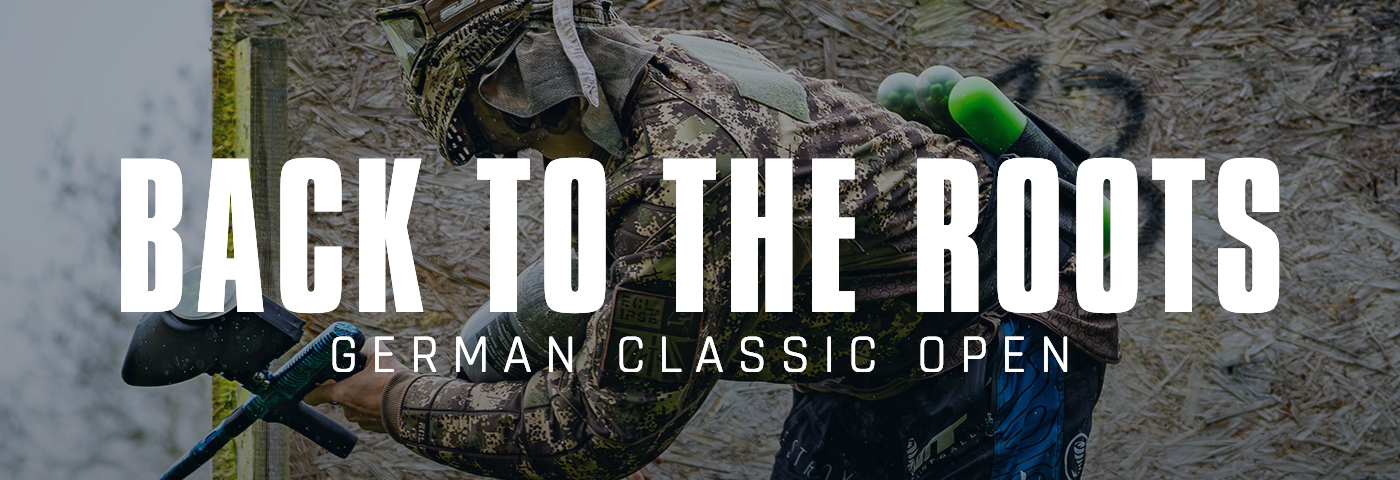


The German Classic Open is a new tournament format that has been around for some time now, reviving the sport's old traditions and virtues. The idea behind the German Classic Open is to allow you to experience paintball the way it used to be. No sophisticated markers with extremely high rates of fire, no X-ball carnage, no intense competition. Just meet cool people, have fun, and play paintball like in the good old days. We had the opportunity to speak with Stephan Hunger, the organizer of the GCO (German Classic Open), and brought you some interesting information.
Times are changing, and paintball is not immune to this. The way of things, as the saying goes. A lot has changed in the last few decades. We have seen a progressive development of the sport for years. Competitive paintball shifted from the forest to the SupAir tournament fields of the world. Anyone who remembers the early days of the sport imagines people crawling through the undergrowth in camouflage suits with mechanical markers. Today's paintball tournament sport is a far cry from that, even though it was the original way of playing paintball with friends. Many miss the original way of playing. Furthermore, modern paintball tournament sport, with its fast-paced gameplay, sophisticated and therefore very expensive markers, and the underlying competitive spirit, is not necessarily for everyone. And since paintball is a sport for everyone, the range of options available also adapts.
For all those who thought it was cool back then to play paintball in the woods, who enjoy playing competitively but more for fun and because of the people there, the German Classic Open now offers a real alternative. The series started in 2024 and was expanded again this year, with three game days at three different locations. The 2025 locations are Area 51 in Bad Breisig, the Paintball Factory Montabaur, and the Paintball Base Solms. As a team, you could either register for all three game days at once, or you could pick one or two events and play only those. This flexibility was well received by the players and teams. As of today, two game days of the GCO 2025 have already been completed, and both were sold out with ten teams.
The playing fields on the three days couldn't be more different. While at Area 51 in Bad Breisig, the competition took place on a meadow between wooden houses and other obstacles, in Montabaur, a forest field with natural vegetation, mounds of earth, and ditches awaited the players. A complete contrast awaits the teams on the third and final day of competition at Paintball Base Solms, where they will compete on a SupAir field with a turf surface. We caught up with Stephan Hunger, the organizer of the German Classic Open, for an interview.
PBS Magazine: Stephan, thank you for taking the time for this interview. Tell us, how did you come up with the idea of organizing the German Classic Open (GCO) and when did you start?
Stephan Hunger: I have to thank you! My team, the 95 Allstars, and I have regularly traveled to England and the USA over the past few years and played various Classic Series there. It's a lot of fun, but not just around the corner. The format really won me over: full throttle on the field, lots of fun off the field, and interaction with the other teams and players. That's how the idea of bringing the whole thing to Germany came about. In 2024, it'll be a single event with 16 teams and international participation. In 2025, it'll continue as a smaller, more relaxed series.
PBS Magazine: The different types of playing fields add a lot of variety. How did you come up with that idea?
Stephan Hunger: I play X-Ball myself with the Cologne Predators. It's fun, no question. But the effort required is immense. The higher you play, the more insane it gets. The different fields should provide variety and appeal to different types of players. Blind layouts are always used, meaning no one has the opportunity to practice beforehand, making reading the fields on game day very important and an additional skill. This way, different skills are addressed, and the team that has practiced the layout the most and best beforehand doesn't necessarily win.
PBS Magazine: The GCO is a tournament format, but as I understand it, the focus is on having fun, right? How do the teams view this?
Stephan Hunger: The best thing to do is ask the teams! The feedback I've received, or what I've experienced on-site, has been overwhelmingly positive! The people are very relaxed, there's a lot of interaction between the teams and players. Many bring their families, which creates a completely different atmosphere. The games are tough but fair, and my referees don't come off the field completely exhausted and can still crack jokes. Since things aren't so serious, the underlying excitement is different. Some teams use the series to introduce new players to competitive sports; I think the format is well suited for that.
PBS Magazine: Stephan, could you perhaps tell us a little more about the rules? The markers work purely mechanically, we've already figured that out. What else do players have to adjust to? Can you please explain that in a little more detail?
Stephan Hunger: Exactly, mechanical markers or electric tires capped at 5.5 BPS. My recommendation: Mechanical! We play capture the flag, meaning each team has a flag, and the game ends when the opponent's flag is hung in their starting base. Points are awarded for each eliminated player, for each unmarked player at the end of the game, for the first flag tear, and for the successful hung. This results in an exciting point distribution. Since everyone plays against everyone else every day, it's worth checking the scoreboard, as this opens up tactical opportunities that aren't possible in the X-Ball format, for example.
PBS Magazine: The 2025 season is almost over. So, the question for you is, what's next year's German Classic Open? What can the players look forward to?
Stephan Hunger: Day three is also fully booked, so there seems to be a need. At the moment, I can very well imagine continuing the whole thing. However, I think I'll move away from the 5-player format and switch to a 7-player format, which is unusual in Germany. The teams currently have 7-8 players on-site anyway, so everyone should be able to play at the same time. 7-player isn't as demanding as 10-player, but it's still a challenge and brings new elements to the game. I've had good experiences with the fields here and am very grateful for the support, but I'm also open to new or additional venues. The first fields have already contacted me and expressed interest.
That was our interview with Stephan Hunger from GCO. We hope you enjoyed it and that we were able to give you a little insight into this new and truly interesting game format. You can also find more information on the event's website or on social media.
You are currently viewing a placeholder content from Klaviyo. To access the actual content, click the button below. Please note that doing so will share data with third-party providers.
More Information